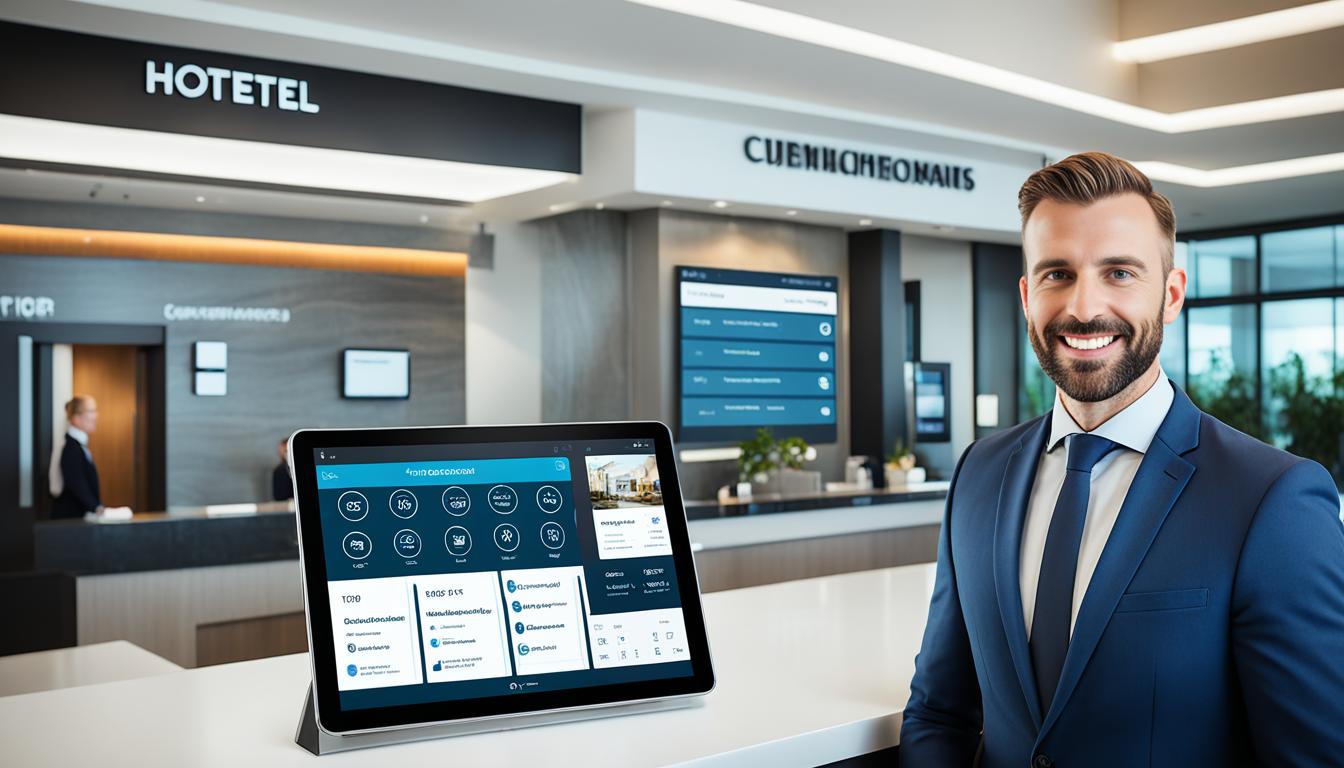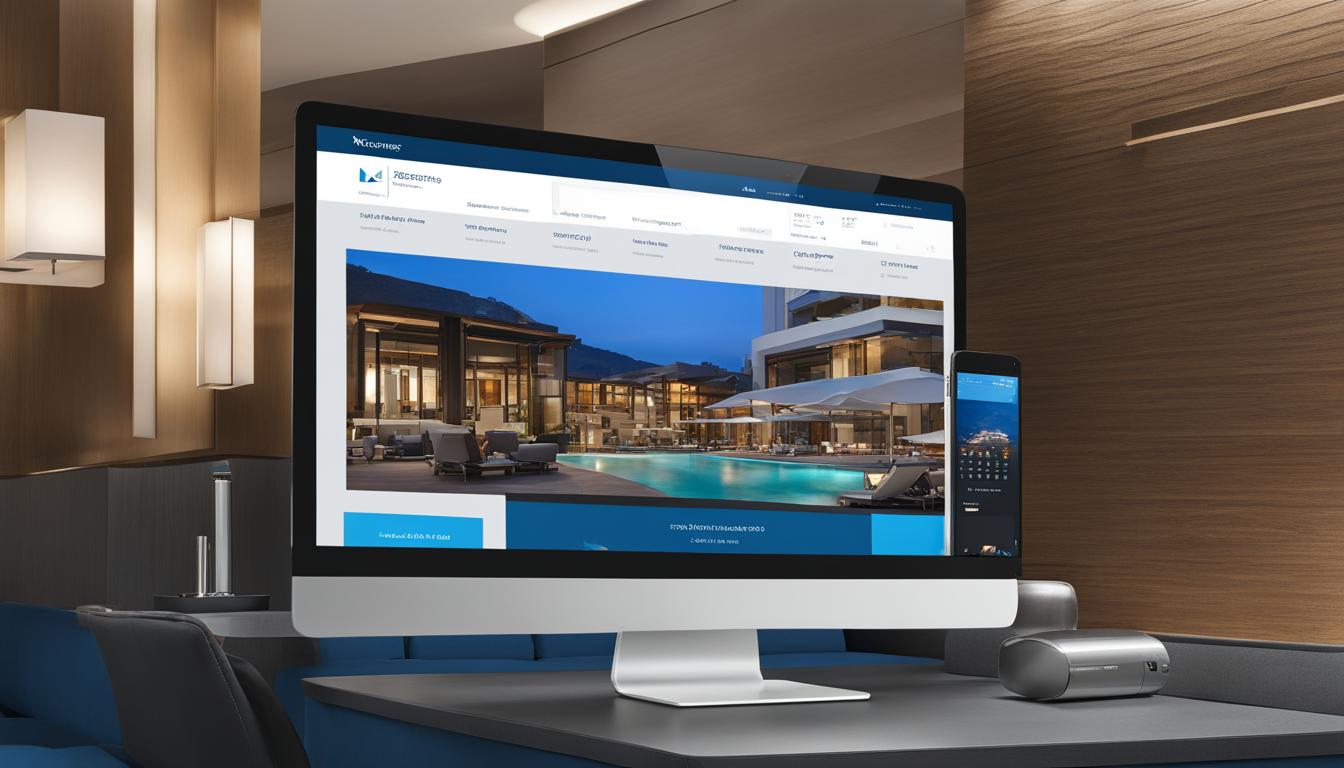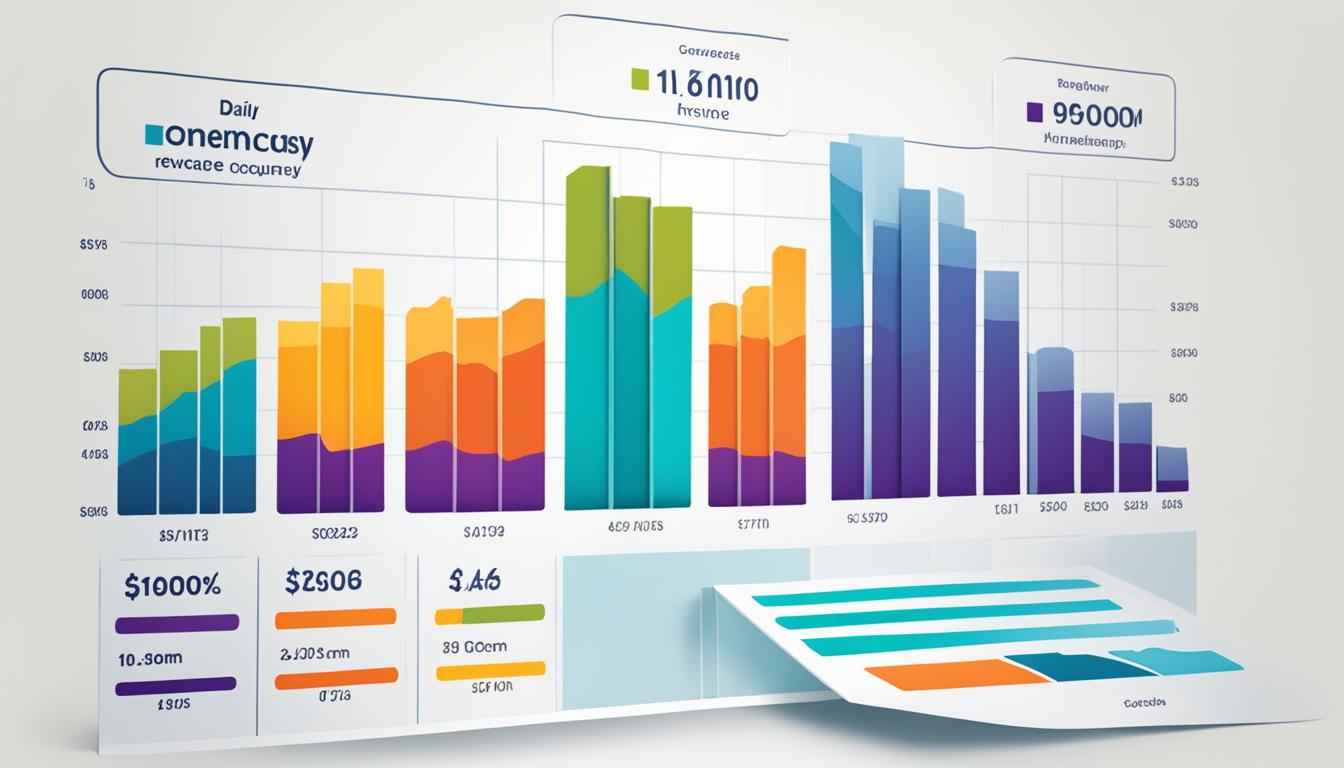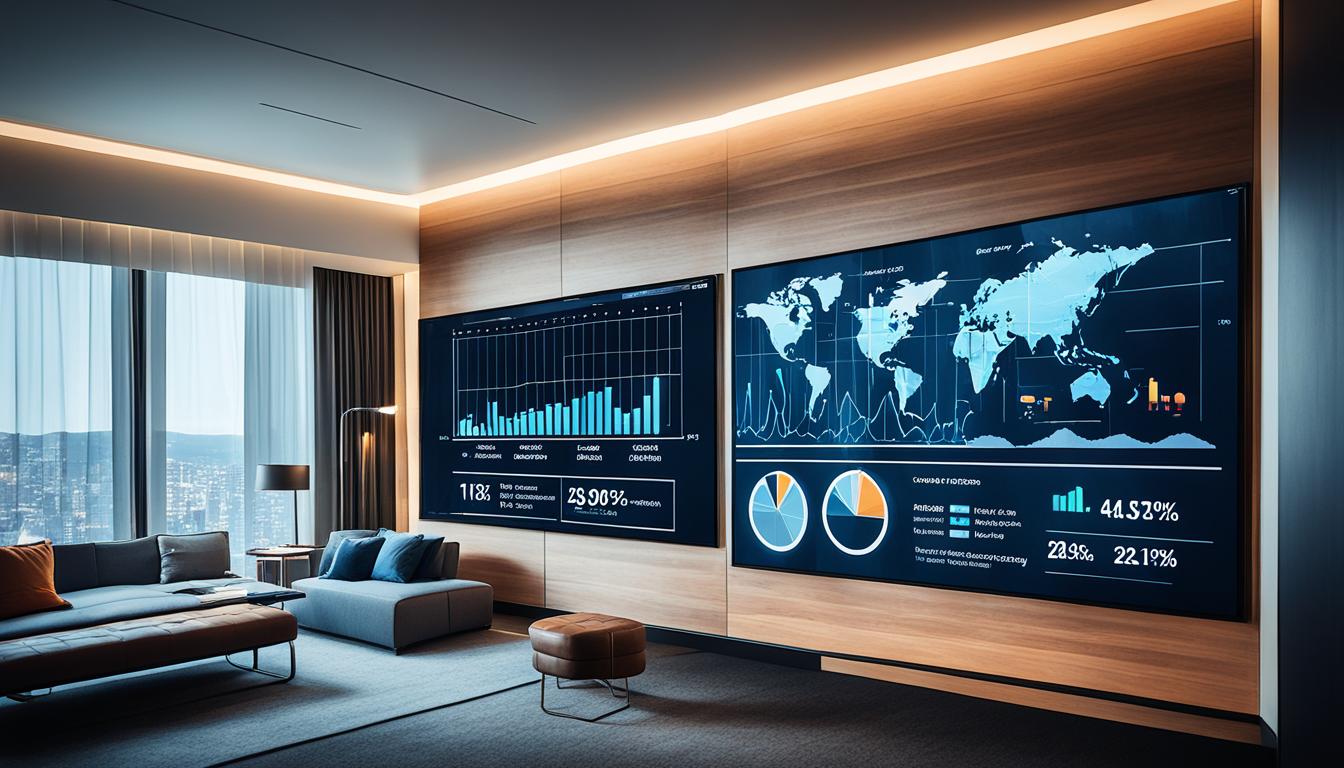When it comes to hotel booking engines, providing a seamless user experience is paramount. Guests expect a smooth and hassle-free process when making their reservations, and a well-designed and user-friendly booking engine can make all the difference.
In this section, we will explore the best practices for creating a seamless user experience with hotel booking engines. By implementing these practices, hotels can enhance guest satisfaction and drive more bookings.
From the moment a potential guest lands on a hotel’s website, their journey begins. The booking engine is where they will complete their reservation, and it needs to be intuitive and effortless. By optimizing the user experience, hotels can increase conversions and ultimately boost revenue.
Through this article, we will discuss the role of a hotel booking engine, highlight the features and benefits of the PlanetHMS booking engine, explore best practices for utilizing a booking engine effectively, and delve into the importance of personalization and data optimization in enhancing the user experience.
Stay tuned as we delve into these topics and provide valuable insights to help hotels optimize their booking engines and provide a seamless experience for their guests.
The Role of a Hotel Booking Engine
The primary role of a hotel booking engine is to facilitate online bookings and streamline the reservation process for guests. By integrating a reliable hotel booking engine into their website, hoteliers can provide a convenient and efficient way for guests to book rooms directly.
With a hotel booking engine, potential guests can easily search for available rooms, view rates and amenities, and make bookings online without the need for any intermediaries. This empowers guests to have more control over their reservations, providing them with the flexibility to choose dates, room types, and other preferences.
By offering online bookings through a hotel booking engine, hotels can not only enhance the guest experience but also increase their revenue. The convenience of booking online encourages more guests to make reservations, leading to higher occupancy rates and improved financial performance.
Furthermore, a hotel booking engine streamlines the reservation process by automating various tasks. It eliminates the need for manual booking management, reducing the chances of errors and double bookings. This helps hotel staff save time and focus on more critical aspects of guest service.
In summary, a hotel booking engine plays a crucial role in simplifying the reservation process and providing a seamless booking experience for guests. It enables hotels to maximize revenue, improve efficiency, and enhance guest satisfaction. To illustrate the significance of a hotel booking engine, take a look at the image below:
PlanetHMS Booking Engine: Simplify and Optimize
The PlanetHMS booking engine is designed to simplify and optimize the hotel reservation process, providing a seamless user experience for both guests and hoteliers. With its user-friendly interface and robust features, this booking engine is a valuable tool for streamlining hotel reservations and maximizing bookings.
At the core of the PlanetHMS booking engine is its user-friendly interface, which makes it easy for guests to navigate and complete their hotel reservations. The intuitive design ensures a smooth booking process, reducing friction and minimizing the risk of abandoned bookings.
In addition to its user-friendly interface, the PlanetHMS booking engine offers a wide range of features that enhance the hotel reservation experience. Guests can easily search for available rooms, view detailed room descriptions and images, and select their preferred room type. The booking engine also allows guests to customize their stay by choosing special requests, such as room upgrades or specific amenities.
With the PlanetHMS booking engine, hoteliers can efficiently manage hotel reservations and make real-time updates to room availability. The system seamlessly integrates with the hotel’s property management system, ensuring accurate inventory management and reducing the risk of overbooking.
Furthermore, the PlanetHMS booking engine offers advanced reporting and analytics capabilities, allowing hoteliers to gain valuable insights into booking trends and guest preferences. This data-driven approach enables hotels to make data-informed decisions to optimize their revenue and improve the overall guest experience.
With its simplicity, efficiency, and user-friendly interface, the PlanetHMS booking engine provides hotels with a powerful tool to streamline and optimize their reservation process. By choosing the PlanetHMS booking engine, hotels can enhance guest satisfaction, increase bookings, and stay ahead in the highly competitive hospitality industry.
The Best Booking Engine Practices
When it comes to maximizing your hotel’s online presence and driving more bookings, it is crucial to implement the best practices for utilizing a booking engine effectively. In this section, we will discuss three key areas that can significantly impact your hotel’s success: hotel website integration, mobile responsiveness, and ensuring a secure and user-friendly payment process.
Hotel Website Integration
A seamless integration of the booking engine into your hotel’s website is essential for creating a cohesive and user-friendly experience. By embedding the booking engine directly onto your website, you eliminate the need for guests to navigate to an external platform, enhancing their overall experience and increasing the chances of a successful booking.
When integrating the booking engine onto your website, ensure that it is visually appealing, easy to navigate, and consistent with your hotel’s branding. Provide clear instructions and a prominent call-to-action, guiding guests towards the booking process. By streamlining the user journey from the moment they land on your website to the final reservation, you can enhance guest satisfaction and drive more conversions.
Mobile Responsiveness
In today’s digital age, having a mobile-responsive booking engine is vital for capturing the growing number of guests who prefer to book through their smartphones or tablets. A mobile-responsive booking engine adapts its interface and layout to different screen sizes, ensuring a seamless experience for mobile users.
With the increasing reliance on mobile devices, it is crucial to make the booking process as simple and intuitive as possible. Optimize the mobile interface of your booking engine by using clear and concise forms, large buttons, and straightforward navigation. This will not only make it easier for guests to make a reservation but also demonstrate your commitment to providing a modern and convenient booking experience.
Secure and User-Friendly Payment Process
An essential aspect of any booking engine is the payment process. To instill confidence in your guests and provide a seamless experience, it is crucial to prioritize security and user-friendliness throughout the payment journey.
Implement industry-standard security measures, such as SSL encryption and PCI compliance, to protect guests’ sensitive information during the transaction process. Offer multiple payment options and clearly communicate any additional fees or charges upfront to avoid any surprises.
Furthermore, ensure that the payment process is streamlined and intuitive, with clear instructions and error messages that help guests navigate through the payment steps. By optimizing the payment process, you can reduce abandoned bookings and increase guest satisfaction.
By following these best practices for utilizing a booking engine effectively, including hotel website integration, mobile responsiveness, and a secure and user-friendly payment process, you can enhance the user experience and drive more bookings for your hotel. In the next section, we will explore the power of personalization in further enhancing the guest experience.
Enhancing User Experience through Personalization
In today’s digital landscape, providing a personalized user experience has become a paramount aspect of any successful hotel booking engine. By tailoring recommendations and offers to individual guest preferences, hotels can greatly enhance the overall user experience and drive higher conversion rates.
One key aspect of personalization is capturing guest preferences. This can be done through various means, such as utilizing customer profiles, past booking history, and surveys. By understanding what guests value and prefer, hotels can curate a more tailored experience that caters to their individual needs.
Once guest preferences have been obtained, they can be leveraged to provide personalized recommendations and offers. For example, if a guest has previously shown a preference for ocean view rooms, the booking engine can suggest similar room options during the reservation process. This level of personalization demonstrates an attentiveness to guest needs and can greatly enhance their booking experience.
Personalization also extends to post-booking communication and guest engagement. By utilizing guest preferences, hotels can send targeted emails or push notifications that provide relevant information, such as spa promotions, restaurant recommendations, or local attractions. This personalized approach not only enhances the user experience but also increases the likelihood of repeat bookings and guest satisfaction.
To implement effective personalization strategies, hotels can utilize advanced hotel booking engine software that is equipped with robust personalization features. These tools enable hotels to efficiently capture and leverage guest preferences, delivering a seamless and tailored user experience throughout the booking journey.
Overall, personalization is a powerful tool for enhancing the user experience in hotel booking engines. By capturing guest preferences and utilizing them to provide tailored recommendations and offers, hotels can improve guest satisfaction, drive more bookings, and establish long-lasting guest relationships.
Leveraging Analytics and Data for Optimization
In today’s digital landscape, analytics and data optimization play a crucial role in maximizing the potential of hotel booking engines. By understanding booking patterns and harnessing data insights, hoteliers can make informed decisions that lead to improved conversion rates and increased revenue.
One powerful way to leverage analytics is by tracking and analyzing user behavior on the booking engine. By studying how users interact with the interface, hoteliers can identify potential pain points or areas for improvement. For example, if the analytics reveal a high drop-off rate at a particular step in the booking process, adjustments can be made to address any obstacles and streamline the experience.
Data optimization is another key aspect of enhancing the booking engine. By collecting and analyzing data from various sources such as guest profiles, demographics, and historical booking information, hotels can gain valuable insights into customer preferences and behaviors. This valuable data can then be used to personalize the booking process and offer tailored recommendations that resonate with individual guests.
In addition to personalization, data optimization can also help hotels optimize their pricing strategies. By analyzing market trends and competitor pricing data, hotels can fine-tune their rates to remain competitive while maximizing revenue. This data-driven approach ensures that hotels can make informed pricing decisions based on market demand and booking patterns.
Moreover, analytics and data optimization are not limited to the front-end of the booking engine. Hotels can also use data insights to streamline back-end operations, such as inventory management and resource allocation. By analyzing data on booking patterns and demand forecasting, hotels can optimize their inventory and allocate resources effectively, ultimately improving operational efficiency.
By leveraging analytics and data optimization, hotels can unlock the full potential of their booking engines. The insights gained from tracking booking patterns and utilizing data-driven strategies can drive higher conversion rates, enhance the user experience, and ultimately contribute to the success of the hotel’s online booking platform.
Conclusion
In today’s competitive hospitality industry, a seamless user experience is paramount to the success of any hotel booking engine. By implementing the best practices discussed in this article, hotels can elevate guest satisfaction and drive more bookings.
One key element in achieving a seamless user experience is utilizing the right booking engine software. The PlanetHMS booking engine stands out with its exceptional features and benefits. Its user-friendly interface simplifies and optimizes hotel reservations, ensuring a smooth and hassle-free process for both guests and hotel staff.
Furthermore, personalization and data optimization play a crucial role in enhancing the overall user experience. By capturing and utilizing guest preferences, hotels can offer tailored recommendations and personalized offers, resulting in increased guest satisfaction and loyalty.
Finally, leveraging analytics and data insights can lead to improved conversion rates and revenue. Understanding booking patterns and utilizing data-driven strategies allows hotels to optimize their booking engine experience, providing valuable insights and personalized attention to every guest.
For hotels seeking to maximize guest satisfaction and streamline their booking process, the combination of following best practices, utilizing the PlanetHMS booking engine, and leveraging personalization and data optimization is the winning formula. For any further inquiries, please reach out to [email protected].







